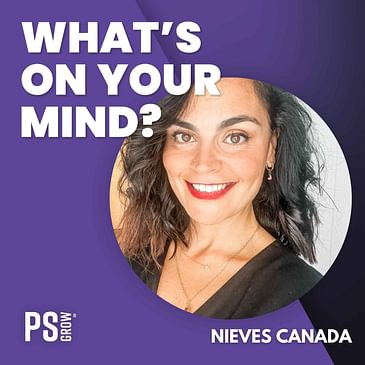#nievescanada #customersuccess #mulitpassionate
259 Nieves Canada About Being Multipotential And Pursuing Multiple Passions | What's On Your Mind?
Personal Development, mindset & selling are on my mind all the time. My name is Peter and I created a weekly Podcast called What is on YOUR mind. Learn from my entrepreneurial guests how they overcame challenges, growth, failure and massive success.
Nieves Canada is a customer success leader with over 16 years in the SaaS industry with a proven track record of building, structuring and scaling customer-centric organizations.
Right now she is VP Customer Success at Settlemint. Next to Customer success, Nieves worked at Showpad and OneSpan in Sales and Business Development.
Do we talk about this? A little bit. Nieves is more than her title, just like you. She is studying a Master in Positive Psychology, is publishing a book for childeren and parents, plays and tutors the piano... A multi passionate person ! How do you discover your talents, how do you make choices in terms of your talents?
I love and admire Nieves her passion to live life.
Connect with Nieves Canada:
https://www.linkedin.com/in/nievescanada/details/experience/
Subscribe to see more inspiring videos: https://www.youtube.com/c/petersnauwaert
Share this video with a YouTuber friend: https://youtu.be/lc-BLulynJg
Leave your email address at http://www.psgrow.com and receive a weekly update when the new episode is available
Support your podcast via Patreon https://www.patreon.com/psgrow?fan_landing=true or WhyDonate https://whydonate.nl/donate/PSGROW/en
I use Willow, a Belgian software to post all social media posts on Twitter, Facebook, Instagram and LinkedIn. Willow's tool and consultants make sure you always know what, how and when to post. I personally am very satisfied with it because of its great ease of use.
From easy scheduling to content inspiration and crystal clear analytics. Contact me at peter@psgrow.com if you want to enjoy 1 month free !
Music: Intro Peter Snauwaert (Copyright)
Voice-over: Stemmig by Sara Fiems
Let's connect:
LinkedIn: https://www.linkedin.com/in/petersnauwaert
Twitter: @petersnauwaert
Instagram: @ps_grow
Facebook: https://www.facebook.com/PSGROW
E-mail: peter@psgrow.com
Get bonus content on PatreonHosted on Acast. See acast.com/privacy for more information.
Personal Development, mindset & selling are on my mind all the time. My name is Peter and I created a weekly Podcast called What is on YOUR mind. Learn from my entrepreneurial guests how they overcame challenges, growth, failure and massive success.
